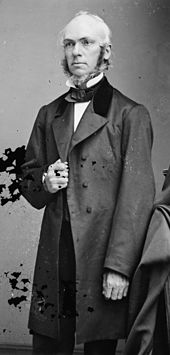James Strong (theologian)
| James Strong | |
|---|---|

James Strong (1822 – 1894)
|
|
| Born |
August 14, 1822 New York City |
| Died | August 7, 1894 (aged 71) Round Lake, New York |
| Nationality | American |
| Fields | Theology, philology |
| Institutions | Troy University (New York) |
| Alma mater | Wesleyan University 1844 |
| Known for | Strong's Concordance |
James Strong (August 14, 1822 – August 7, 1894) was an American Methodist biblical scholar and educator, and the creator of Strong's Concordance.
Strong was born in New York City and graduated, in 1844, as valedictorian from Wesleyan University. Subsequently, he was mayor of his home town on Long Island. Later, having settled in Flushing, New York, he pursued biblical studies, held various local offices, and organized, built, and was the president of the Flushing railroad. In 1856 Wesleyan University granted him the degree of Doctor of Divinity (D.D.). From 1858 until 1861, Strong was both Acting President and Professor of Biblical Literature at Troy University (New York). In 1868 he became Professor of Exegetical Theology at Drew Theological Seminary, where he remained for twenty-seven years. In 1881 Wesleyan honored Strong with the degree of Doctor of Laws (LL.D.). He died at Round Lake, New York in 1894.
His best known work is Strong's Exhaustive Concordance of the Bible, first published in 1890, of which new editions are still in print. Numerous revisions, such as The Strongest Strong's Exhaustive Concordance of the Bible and The New Strong's Exhaustive Concordance of the Bible, along with adaptations of the concordance to translations other than the Authorized King James Version while retaining the "Strong's" or similar branding, such as the Strongest NIV Exhaustive Concordance are also available. "Strong's numbering" of Greek and Hebrew words, have dominated the enumeration of such words in Bible study helps to the present day, only recently being supplemented by Goodrick-Kohlenberger numbering.
For the concordance, Strong numbered every Hebrew or Greek root word which was found, for ease of reference. This numbering system (8674 Hebrew roots and 5523 Greek roots) is now widely used in the English speaking world and also widely available on the web, where it can be used with many translations, often in conjunction with other hermeneutic tools. In spite of the Greek roots being numbered up to 5523, there are only about 5415 actual entries, since more than 100 numbers were jumped over. At the end of the Greek Dictionary of the New Testament section of the first edition of the Concordance is the following Note: "Owing to changes in the enumeration while in progress, there were no words left for Nos. 2717 and 3203–3302, which were therefore silently dropped out of the vocabulary and references as redundant. This will occasion no practical mistake or inconvenience."
...
Wikipedia
